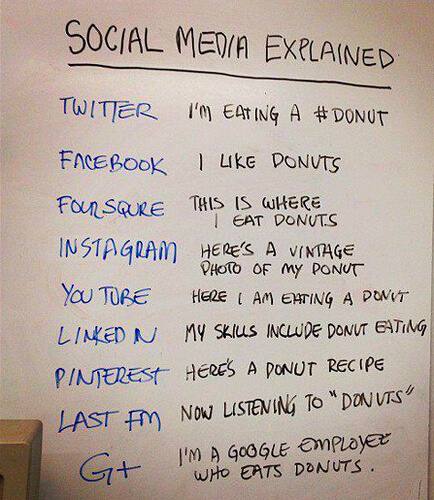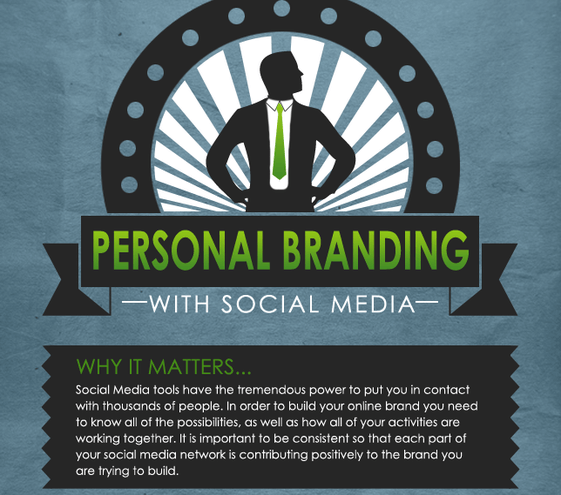Facebook, Twitter, Tumblr, Google+, Pinterest and LinkedIn– what do these all have in common? They are just a few of the most popular forms of social media interaction. All of these sites are used for specific social reasons, whether it be keeping in touch with friends from school, blogging, sharing your thoughts and opinions with celebrities and "followers," and most recently, connecting and networking with future employers. But in a world where we feel it necessary to post pictures from our recent trip to the Bahamas (eep, well, almost all of them) and we can't help but share our opinion on everything (whoops, maybe we should've thought about retweeting Amanda Bynes' latest antic), the lines between personal social media and public social media are starting to blur.
Here some tips on how to maintain a professional social media presence (and trust us, it's okay to not share everything. Really).

http://blog.hubspot.com/blog/tabid/6307/bid/32658/13-Ways-to-Create-a-Cringeworthy-Social-Media-Presence.aspx
-
To post, or not to post…that is the question.
We've all been there — after a long day, we feel the itch to share whatever happened with social media…"Can you believe they're dating?" "I so want to craft this!" "Ugh, traffic absolutely sucked, I hate my commute" But we need to remember that our social media accounts also work as our social media footprint. Once we've posted something, it's out there- forever.
Jeffrey Morosoff, professor at Hofstra University and Board of Directors Member of Public Relations Professionals of Long Island, shared the following with CM: “If you wouldn't want your grandmother to see a certain photo or quote on your Facebook, delete it. Employers will seek ways to find out about the type of person you are, so make sure Facebook content casts you in the best light. Avoid pictures and comments that could put your character into question. Start tweeting more carefully; watch your language, your politics, and how you express yourself. Spelling, grammar and punctuation count on all social media platforms, even when you tweet.”
Theoretically, sites are designed to let you post whatever you want, but when it comes to potential employers, they might not want to see your latest check-in at the bar for the sixth night in a row. In short, think before you post. Easy rule to follow: if you think you'd be embarrassed if your parents saw it (or better yet, if you'd panic if your social media account was pulled up during a job interview), hold back. Morosoff continued, “Keep in mind that as creepy as this sounds, potential employers use social media as a window to see you when you're not looking. It's important, then, to always look your best."
-
Can my co-worker be my friend?
Not to say that co-workers can't be our friends, but put some thought into it before you add them on social media. You may not want something that happened in your personal life becoming the latest office gossip. However, if your accounts are "clean" and are used in a positive way, like building up your personal brand, then feel free.
According to Jenna Mucha, Social Media Strategist for the Bernard HODES Group, it could actually help lead you to a new opportunity in the job market: "Have specific interests in the job field you’d love to work in? Follow, connect and communicate with thought leaders in that industry on Twitter- this can help you build professional relationships before you even hit the workforce."
Sharyn O’Mara, PR Director at the matrimonial and family law firm Wisselman, Harounian & Associates, P.C. and Board Member of the Social Media Association, said that it can actually be a good thing to add your co-workers on social media: “I think you should add your co-workers on Facebook/Twitter/other social media if they invite you to connect. The idea that you can compartmentalize different parts of your life is not realistic anymore and you should be open, honest and active on social media to make the best impression possible.”

-
Building up a personal brand.
Differing from the job market ten years ago – or even five years ago – social media has become a way to get your personal brand (interests, talents, skills, job experience, etc.) out there and to the attention of future contacts and potential employers. O’Mara also shared with CM, “It is important for young professionals to establish a digital footprint and start to create their own "brand" and identity online. Having a blank slate is not a positive slate. College grads should not be a ghost on the Internet but should work to build a positive online presence (even more important if they want to work in PR or marketing).”

www.thebrandingmuse.com
Social media has many advantages, like allowing people the ability to connect with celebrities via Twitter, or even to network with recent collegiate alumni and rub elbows with our dream jobs. But with advantages, also comes the drawbacks.
Always remember to maintain your integrity and promote your skills and interests (hint: anything that would be a great conversation starter on a job interview, like travelling, hiking, fantastic public speaking gigs you've had, etc.). Mucha also explained that social media should be utilized to build yourself up: "Do you use social media as a networking tool to find internships and job leads? If not- you should. Create a LinkedIn profile and list out your skills so that recruiters can easily search and find you." Morosoff also shared, “LinkedIn is the primary platform for representing yourself as a professional; employers are looking at LinkedIn as an effective way to find out how you measure up against your competition.”
thumnail image: http://fwinteractive.com/make-your-online-presence-professional/



















